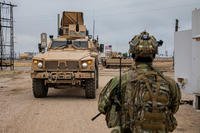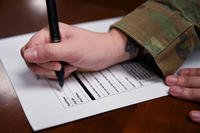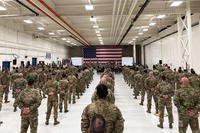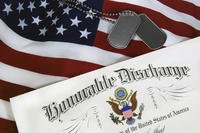Fear of crime and personal assault is not unusual or uncommon. Regardless of age or gender, the fear of crime is felt by everyone at sometime. However, servicemembers who live alone or spouses married to deployed service members may tend to feel more fearful and have a heightened awareness of their surroundings. Particularly at the beginning of a deployment, the fear of crime may be more acutely felt by military spouses because they find themselves suddenly "alone".
Listed below are some ideas that will help reduce the risk of danger and, if followed, will help ease the anxiety associated with living alone. Tips cover basic street sense, home and personal property, and traveling.
Street Sense:
Familiarize yourself with unit, community, and local emergency reporting procedures. Keep these phone numbers next to the phone.
If you live alone or your spouse is deployed, don't advertise it. This is not a message you want to send to others except for trusted friends and neighbors.
Regardless of where you are, stay alert and aware of your surroundings. Appear calm and confident in your mannerism.
Trust your instincts. If you feel uneasy about someone or a particular situation, remove yourself.
Have your car keys or house keys ready prior to opening the door.
Park in well-lit lots. If you have to work late or are shopping at night, consider having a security guard walk you to your car. Do not display large amounts of money or other valuables.
When shopping, keep your money secured in a billfold and your purse closed. Do not display large amounts of money or other valuables.
If you think someone is following you, change direction and head toward a well-lit and well-populated surroundings.
Tell children to never admit to being home alone on the telephone or to someone at the door.
Teach children how to contact the police. Make sure they know their address and phone number, as well as a neighbor's.
Always lock your doors, even if you are only going out for just a few minutes. This includes garage and cellar doors as well.
Outside Your Home:
If you feel the need for an extra key to be available, do not leave one "hidden". It is much safer to leave the key with a trusted neighbor.
Make sure all entrance doors can be securely locked. Consult with base housing or visit your local hardware store for proper appliances.
Try "casing" your own home at night and during the day. Attempt to gain access when locked and secure. If YOU can get in, so can anyone!
Good outdoor lighting is a deterrent to crime. Lighting should illuminate all potential entrances.
Use only initials on mailboxes and in the telephone book.
If there is not a way to identify a visitor, install a peephole. This is safer than partially opening a door with a chain lock.
When returning home, be observant to any changes to the exterior. If anything looks unusual or suspicious, do not enter.
Inside Your Home:
If you receive an obscene phone call, hang up immediately. Don't engage. If you continue to receive calls, report them to the police or military security personnel, as well as the phone company.
Make a list of all valuables that are in your home. Take a picture or videotape the items for your records. This will also assist you when you must relocate and discover missing items!
If you are going out in the evening, leave a few lights on or leave the radio playing inside.
Ask for identification from any repair person or base maintenance personnel.
Dogs can provide excellent protection. Even small dogs can hear noises and provide an alarm.
Teach children about emergency situations and how to call the police.
Guns are responsible for many accidental deaths in the home. If you choose to own one, make sure they are safely stored, trigger locked, and unloaded. Ammunition should be stored separately. If you live on base, you generally have to register the gun with the military police.
Check within your neighborhood or base housing quarters for a Neighborhood Watch organization. If one does not exist, contact the local police or military security personnel to help you start one.
Traveling Away From Home:
Keep car doors locked at all times. Check inside and underneath the car prior to entering.
When driving a long distance, let someone know of your intended route of travel and approximate arrival time.
Prior to leaving, make sure your car is in good running condition. Make sure that you have enough gas to get to your destination.
If you do have car trouble, do not allow a stranger into your car or get into theirs. Ask them to contact the highway patrol.
Exercise caution when using highway rest stops. Don't go in alone if there is little or no activity in the area.
Have your mail kept at the post office until you return home.
Make arrangements for lawn care and newspaper service. These are clues that can demonstrate whether someone is home or out of town.
If you are going to be gone for an extended time, contact base housing and military police (or civilian police if you live off-base). These agencies will check your home periodically during your absence.

















